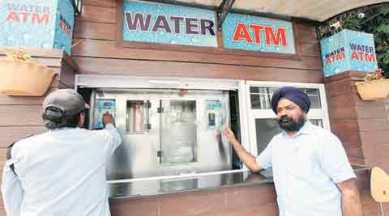Water ATMs: Now put a coin, and get a litre of clean water in Mohali
This plug-and-play model that can be customised according to space and need is revenue-generating and in public service.

Ever since Ramandeep Singh, director of Synergy Solar Inc, built and operated one-of-its kind water vending machine in Phase 9 Mohali a year back, people, including workers, passers-by and labourers, have been queuing up everyday to get a cool clean litre of water. Slip in one rupee coin, place your bottle and pure chilled drinking water flows right out. With water woes gripping the Tricity, Singh’s ‘water ATMs’ might just be the solution to ensure clean drinking water at a nominal cost.
Soon, Mohali will witness five more water ATMs, confirms Singh. According to him, the Mohali Municipal Commissioner has given his company the green signal to build, operate and strategically place five water vending machines at public places comprising Mohali’s Rose Garden, Silvi Park, Bougainvillea Garden, near Fortis Hospital and in Phase 7. Singh, who has also forwarded the proposal for Chandigarh, has applied for patent for his creation.
monthly limit of free stories.
with an Express account.
“In Chandigarh, the proposal is for water ATMs at Rock Garden, Sukhna Lake and Rose Garden,” he says.
A coin-operated water vending machine with in-built RD water purifier and chiller, powered by solar, wind and AC/grid, his is a model that uses the supply of raw water by the government. Running on commercial water and electricity meter, the machine is housed in a hut-shape structure and has three windows — one for security guard, one for the bottle and one for the coin.
To keep a close check, there are CCTV cameras and guard on duty, who also exchanges rupee notes for coins and even gets the bottles washed, cleaned and disinfected. In Mohali, the ATMs will operate at a nominal cost of either a rupee or two, and bottles and water jars will be washed at the same cost.
This plug-and-play model that can be customised according to space and need, says Singh, is revenue-generating and in public service. “The Punjab government charges five paisa per litre, elsewhere it’s 10, and another 20 or 25 paisa goes into filtration process. A rupee for a litre manages to recover all costs,” says Singh. While in India water is considered a right and charging for it is a huge debate, Singh feels in order to value it and use it properly, one needs to attach a price, even if it’s a rupee. “We had set our first fully automatic machine of 30,000 litres at a village in Hoshiarpur for free. Although it’s being operated peacefully, people use water for bathing, washing and other domestic purposes. It’s not meant for that; it’s for drinking alone. Hence, we decided to put a charge on thee upcoming machines,” he says.
While Singh has applied with the Indian Railways too to place machines at stations, his water ATMs will be seen across bus stops in Delhi as okayed by the Delhi Jal Board.